How hundreds of refugees and migrants survive in a tent city between a Paris club and a floating restaurant
A man invites me to sit on a wooden chair at the camp’s entrance. He tells me his name is Djella, that he is originally from Palestine and has lived here for one year. “The camp is probably a year and a half old,” he says. “We can’t leave the camp because we have no money, no papers, nothing.”
Welcome to the Quai d’Austerlitz, home to one of the latest of Paris’s migrant camps and one of at least four tent cities to have sprouted up around the city over the course of the past year.
Hundreds of men sit huddled in nylon tents by the left bank of the Seine. Located in Paris’s southeastern 13th arrondissement, the camp is only a few hundred meters from the Austerlitz train station, and in sight of the French Ministry of the Economy and Finance across the river. The noise around the camp is unremitting as cars speed across the bridge overhead. The men are cold, tired, hungry, and now wet under the frigid autumn rain.
The camp is divided into two pockets along the Quai. One part of the camp sits under a concrete bridge straddling the Seine. The other is located about 300 meters east, where migrants reside between the terrace of the Wanderlust, a popular nightclub, and a barge restaurant called the Playtime. While the irony is as cruel as it is obvious, it holds few surprises for the camp’s inhabitants. Many of them have already spent months waiting for their luck to change on the sidewalks of Paris.
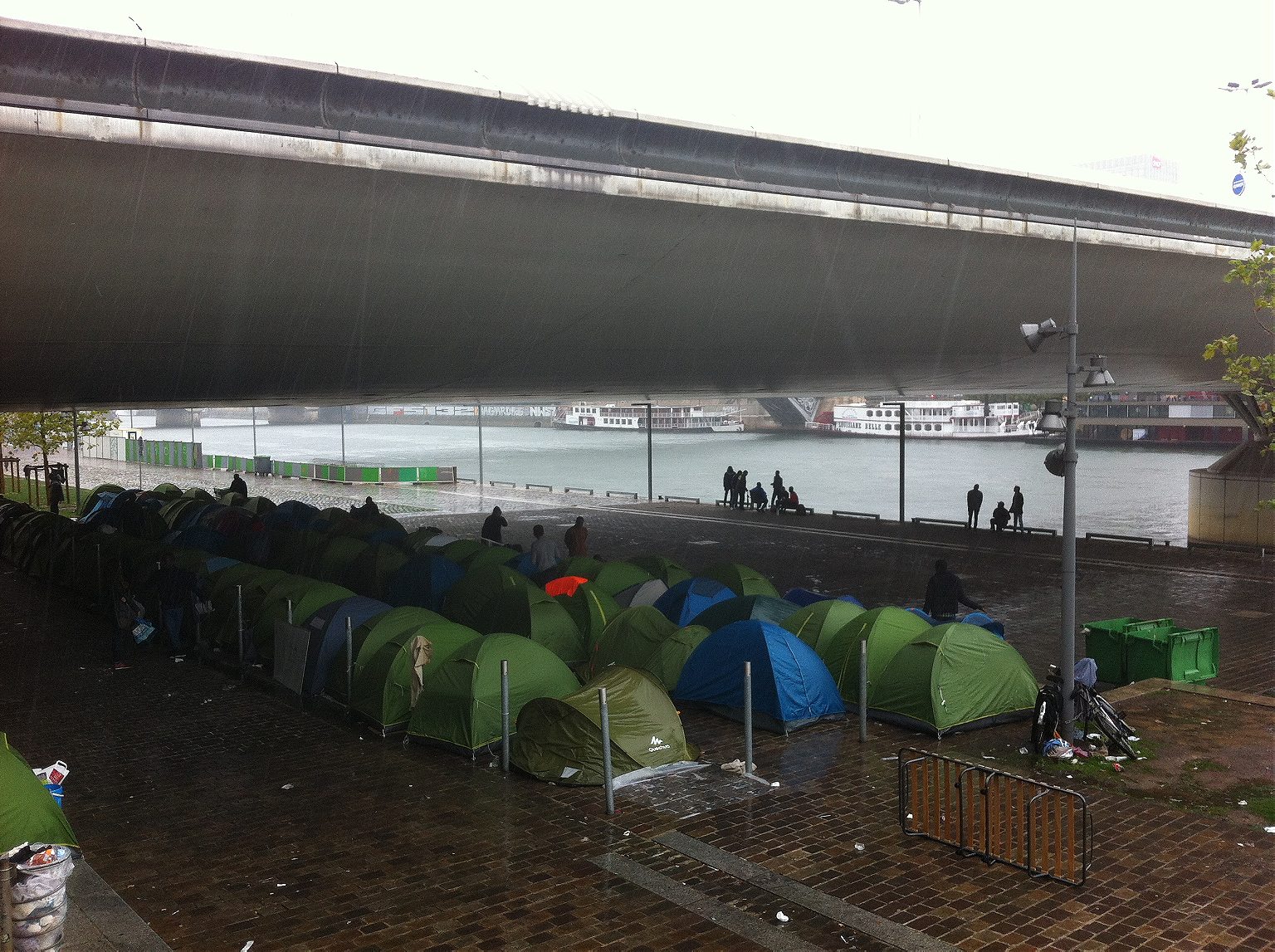
“We don’t know how many people actually live here because some of the tents are empty and others have more than one person living in them,” Djella explains. “When someone passes, they can bring food or clothing, so that’s why we wait.” Djella is quick to note the irregularity of these visits. “Sometimes we get food 3 or 4 times a week… we don’t eat everyday.”
Most of the people here sleep in green or blue one-compartment camping tents, donations from individuals or organizations like Emmaus Solidarité. Throughout the camp one also finds damp mattresses and carpets, reminders of the migrants’ vulnerability in the elements.
To list the men’s homelands – nearly all of the Austerlitz camp’s inhabitants are men – is to compile a catalog of the world’s most war-torn and impoverished regions. While the Sudanese and Eritreans appear to constitute the largest number of the camp’s inhabitants, one also finds Syrians, Iraqis, Malians, and Chadians.
When I begin speaking to the migrants in mid September, some say they intend to find their way to England. Others want to stay in France. Whether or not they would find themselves under a roof this winter was uncertain. Wishes and hopes are precious luxuries, to be defended and conserved like food and blankets.
Bags to hold and protect belongings from the rain are in high demand
A sudden increase in media coverage brought about by photos of the body of 3-year-old Syrian refugee Aylan Kurdi, and Germany’s pledge to welcome thousands of refugees has lead to a surge in food donations. But the residents of the camp remain short on many necessities. Nail clippers, razors, shoes, winter coats, shampoo, soap, painkillers, and bags to hold and protect belongings from the rain are all in high demand.
At the height of the camp’s expansion it was said to hold as many as 500 people, with another 300 housed in the lycée Jean-Quarré, a former high school nearby. It evolved gradually over the course of the past year, with its population peaking this summer following the eviction of La Chapelle, another camp that once housed around 250 migrants near Paris’s Gare du Nord train station in the 10th arrondissement. When authorities closed that camp in June, many of its inhabitants made their way to Austerlitz.
The fear of deportation combined with a mounting media presence around the camps has made many of the people here wary of curious outsiders. While many of the camp’s inhabitants allow me to speak with them, most of them do so under the condition that I would not record their interviews.
They speak of days spent waiting for nothing in particular. Some complain that donations arrive without regularity – too little for weeks and as an uninterrupted flow on certain days.
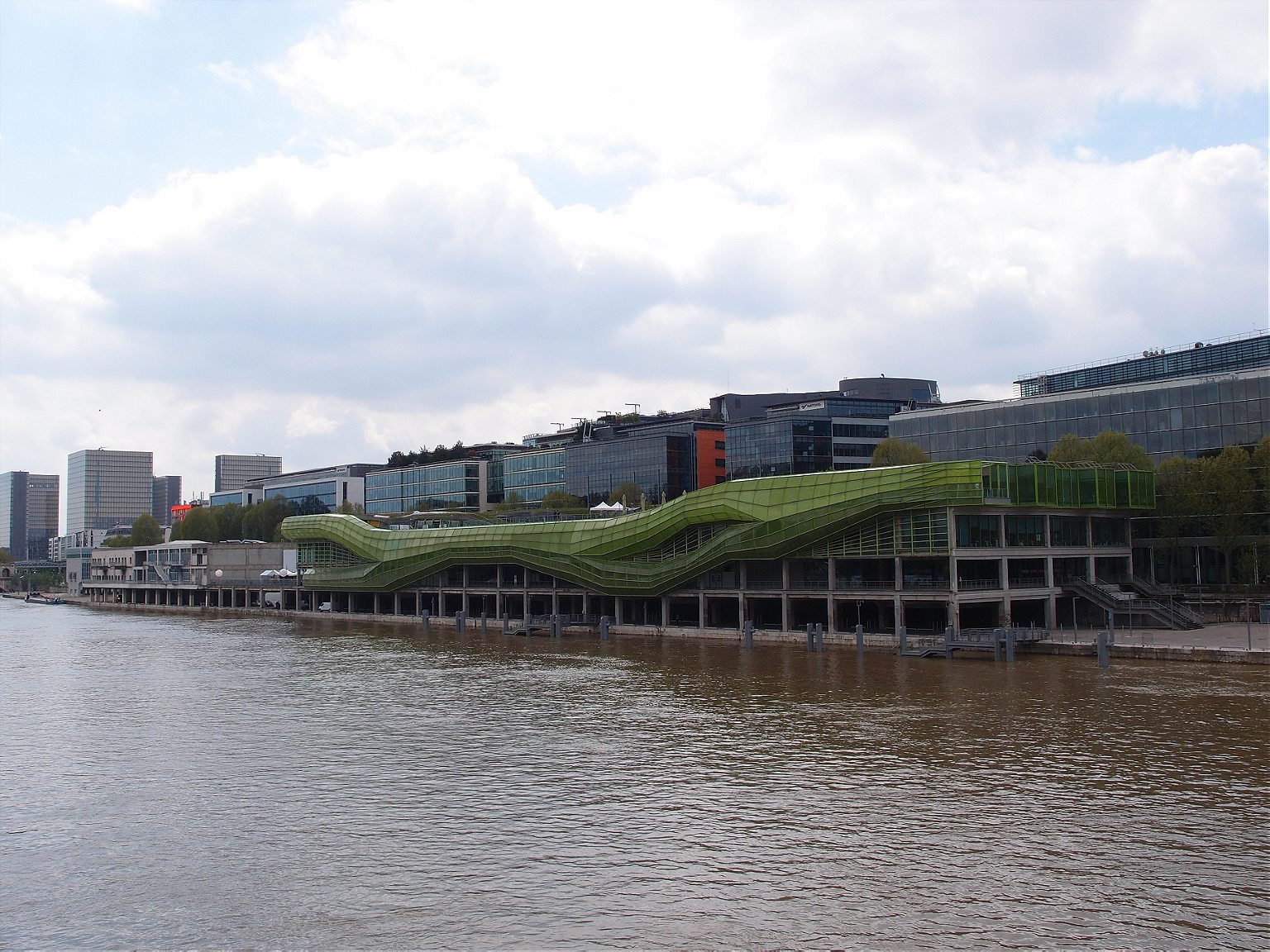
Their attention is quickly diverted when a white car pulls up to the arrangement of tents beneath the Charles de Gaulle Bridge. A woman steps out and, with the help of an Arabic-speaking assistant, opens her trunk to dole out supplies. Before she even has time to open the trunk, a group of men has already surrounded her to ensure that they will receive supplies. Some of the men argue and shove, but most simply want to ensure they get their fair share of the donations.
The woman driving the car identifies herself as Ourdia. She lives in Rouen, a small city in Normandy. She discovered the camp while reading about the migrants’ plight on the Internet. After collecting donations in Rouen, she drives to Paris each week to distribute clothing, food, and hygiene products.
“Sometimes they fight over the supplies,” she says. “There’s never enough for everyone.” Pointing to the tents under the bridge, she tells me the first to arrive in the camp were the Sudanese, some of whom have been living on the Quai d’Austerlitz for nearly a year. “People arrive each day,” she continues. “When the refugees arrive in France they learn about these camps by word of mouth and move here automatically.”
Karim, her assistant in the camp, is from Syria, and has lived on the Quai d’Austerlitz for a month and three weeks after having been homeless in Paris for eight months. He tells me he intends to leave Paris as soon as he can. “It’s bad here,” he says.
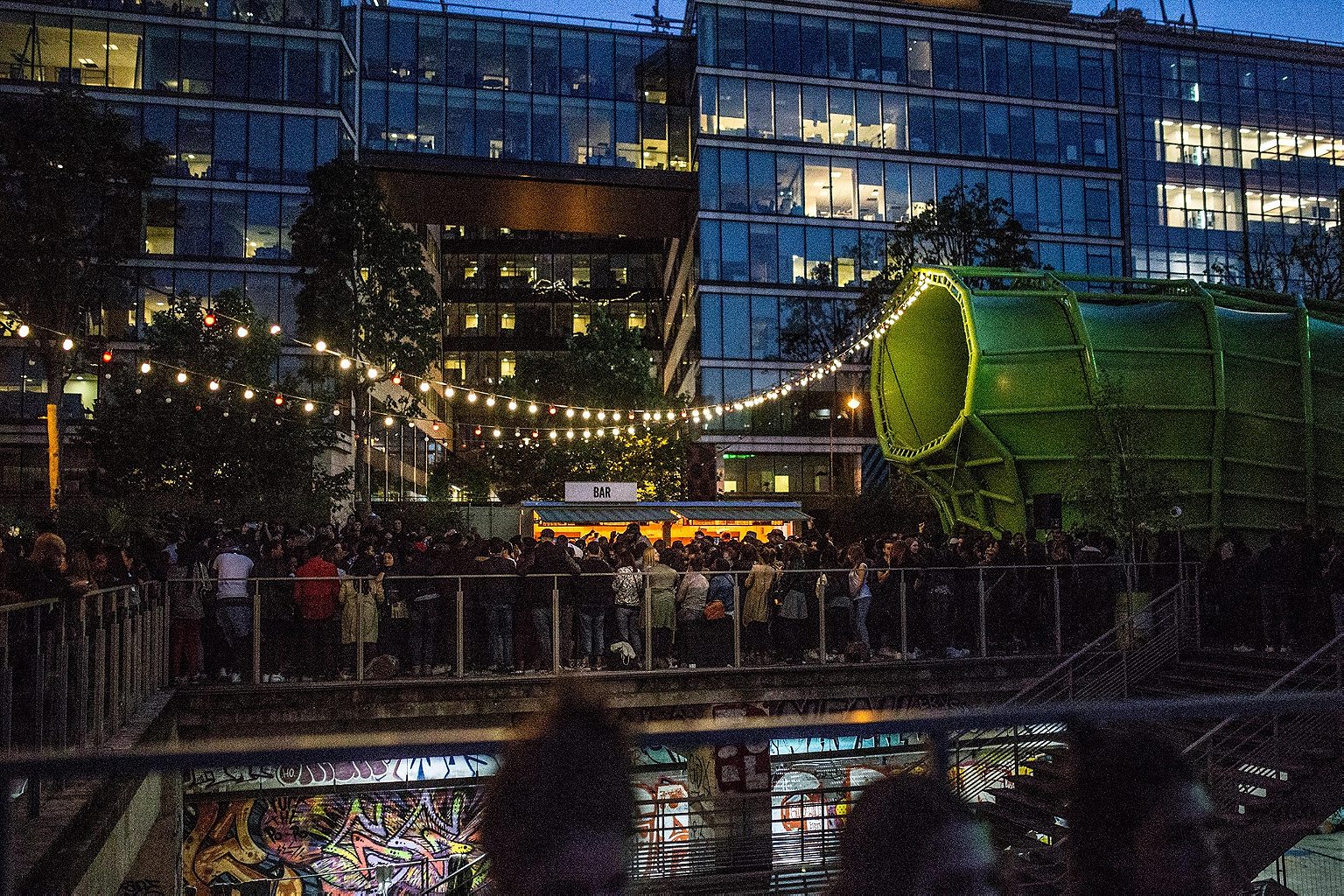
A man named Abdelrhani soon joins the conversation. Although he grew up in Morocco, Abdelrhani claims to have lived in France for 30 years. “I am homeless and still not a citizen,” says Abdelrhani. “The situation for people like me is only going to get worse with all the new people coming in,” he adds, fearful that public opinion and state resources will be overwhelmed by a flood of new refugees. According to Abdelrhani, ‘les anciens,’ or those who have already lived in France for more than a year constitute about a third of the camp.
“Because the situation here is disagreeable there are tensions,” he says. “The mentalities here can be very different, you know. There are the North Africans, the sub-Saharans… each has his own mentality, his own civilization.” He also explains that the migrants have very different levels of education. “Some people have gone to university, some have not, and there is a great variety of individuals.”
Abdelrhani is especially keen to explain that the suffering in the camps extends far beyond material concerns. He tells of an Iraqi Kurd he sometimes shares meals with who remains traumatized by the violence he witnessed in his homeland. “He is so terrified, he’s been here for one year, but you immediately sense he is terrorized.” “For the Syrians, it’s just as bad,” he says. “An entire country disappeared, it’s unbelievable.”
When Abdelrhani begins talking about the volunteers who bring food and other donations to those residing on the Quai d’Austerlitz, his voice becomes inflected with hope.
“You know who comes?” he asks. “It’s incredible, the kids of the cités!” he says, referring to the young men and women of Paris’s heavily North and West African suburban ghettos. “They are bringing us great help…they bring tents, they bring food, clothes, sometimes they bring cigarettes for the smokers…these are personal donations.”
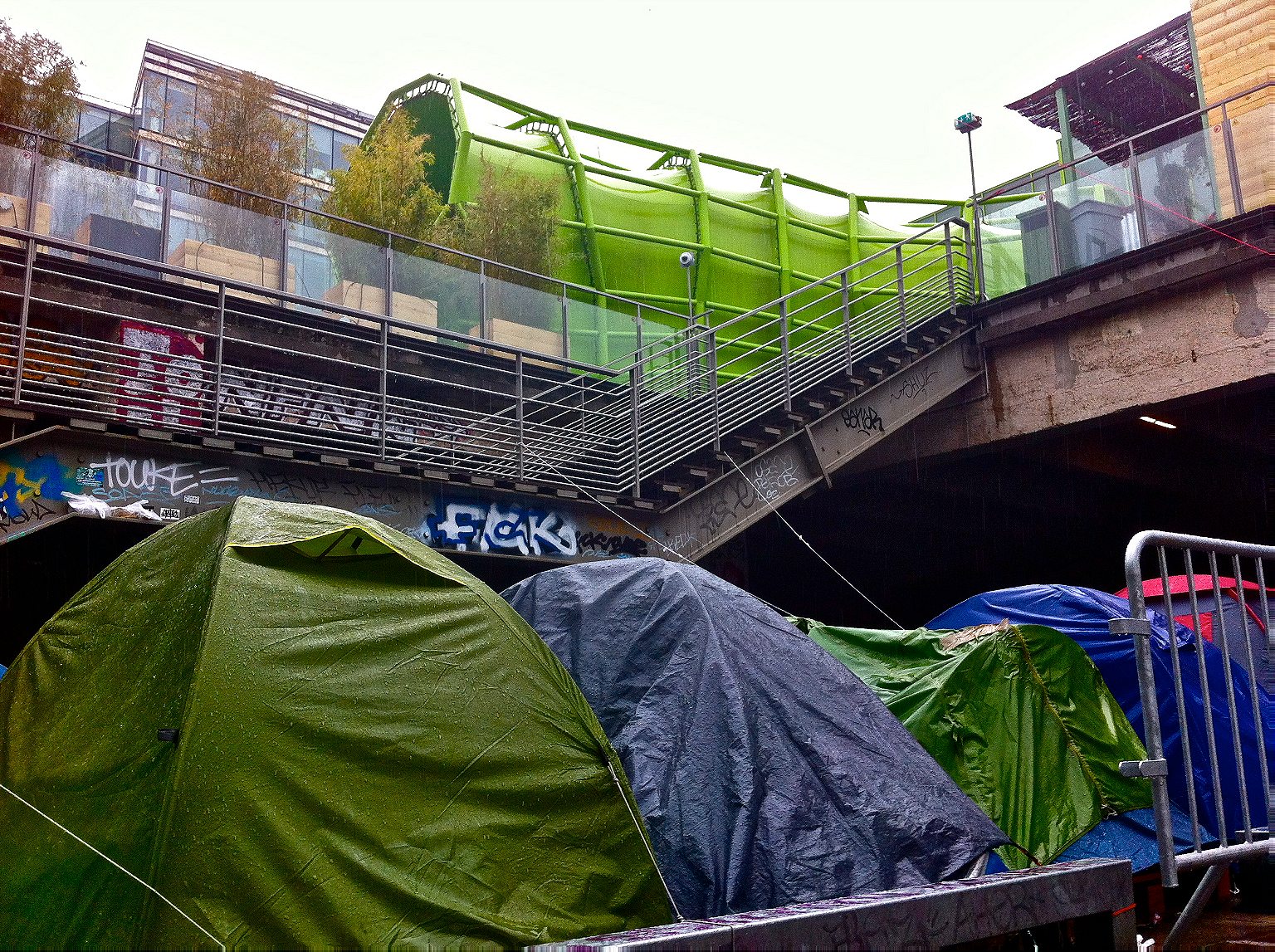
Along with their communities, the volunteers have created simple grassroots networks to deliver aid to the migrant camp. “Neighbors give money to buy supplies,” says Abdelrhani. “In the very beginning people were sleeping without tents. There were just sleeping bags on the ground. Thanks to the volunteers, they started getting tents.”
The importance of volunteers is undeniable. Following my conversation with Abdelrhani, I watch at the camp’s entrance as two young women in headscarves distribute another bag of hygiene products and a few tents.
An argument breaks out between two of the camp’s residents over a tent, as one man argues he waited three weeks for his own tent, while the other man has only just arrived. The women, clearly experienced when it comes to mediating these disputes, successfully persuade the recent arrival to give away his tent.
Abdelrhani’s favorite words are “incredible” and “unbelievable.” When he talks about the camp, he does not exhibit anger but sheer disbelief at what has happened to him and his neighbors. He reserves most of his incredulity for the people he sees coming and going from the Wanderlust and the Playtime. “At night, in the restaurant, there are people eating dinner; here there’s a nightclub, people come and dance, I don’t know how they have fun,” he sighs. “They look at us. There’s no humanity.”
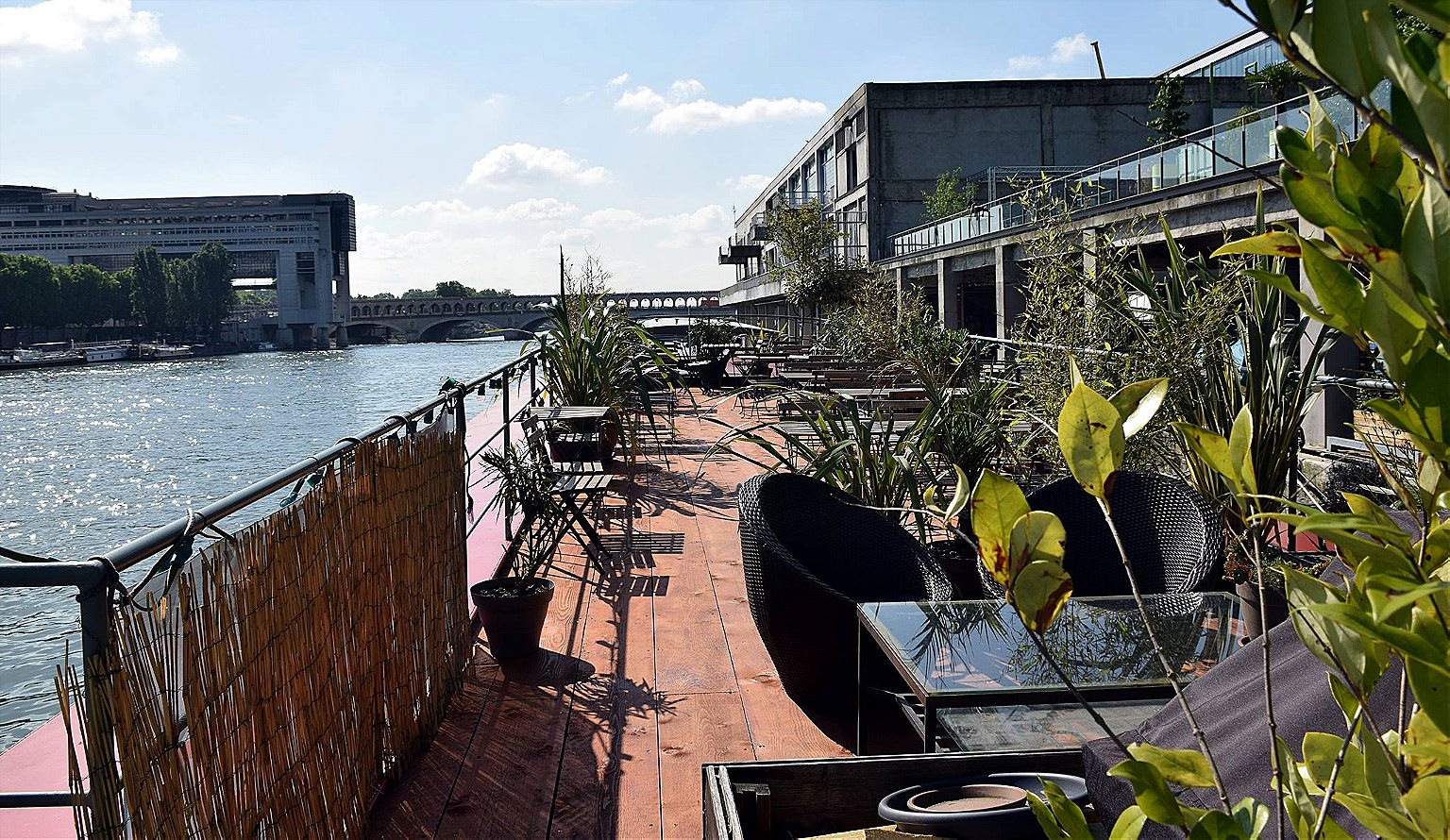
To answer Abdelrhani’s question as to how people can dine and party in the face of misery, I pay a visit to the Playtime. To shield its patrons from the sight of the camp, the restaurant has erected two large wooden blocks in front of its main dining area.
With a pool on its bow, miniature cactuses on its dining tables, a selection of grilled steaks and a 12-euro cocktail menu, the Playtime is presented as a relaxed summer hangout for moneyed hipsters. Olivier Barrot, who works on the Playtime greets me on deck. Barrot tells me he has worked on the Playtime for two years and watched the camp grow.
“It began as just a few tents, I saw them learn to live together and adapt to living beside us.” Barrot describes the camp residents as ‘very respectful.’ “I find them very organized, but what bothers me most is that toilets were only installed recently,” he says, gesturing in the direction of portable toilets installed by the city government.
We venture below deck to speak with Dimitri Chliouras, who Barrot introduces as one of the Playtime’s managers. Before I can ask a question, Chliouras tells me how disgusted he is with the media’s sudden rush to cover the camps.
“They’re all fighting over ‘who does more for the migrants’ even though it’s complete self interest,” he said. “What’s the problem, the visibility of these people in misery?” he asks me. “Because if we really wanted to house them, there’s room. In Europe we have more empty apartments and houses than homeless people.”
Though he does not demonstrate the same outright contempt for his clients, Chliouras’s voice drips with sarcasm when he tells me how numerous diners complain about the restaurant’s proximity to the migrant camp. “They tell me after they’ve eaten, once the plates have arrived and they’ve had something to drink.”
“During the past year we gave away plenty of food,” says Chliouras “but then there were two days when we didn’t have any leftovers and [the residents of the camp] made a scandal out of it, so the bosses told them to never set foot here again.”
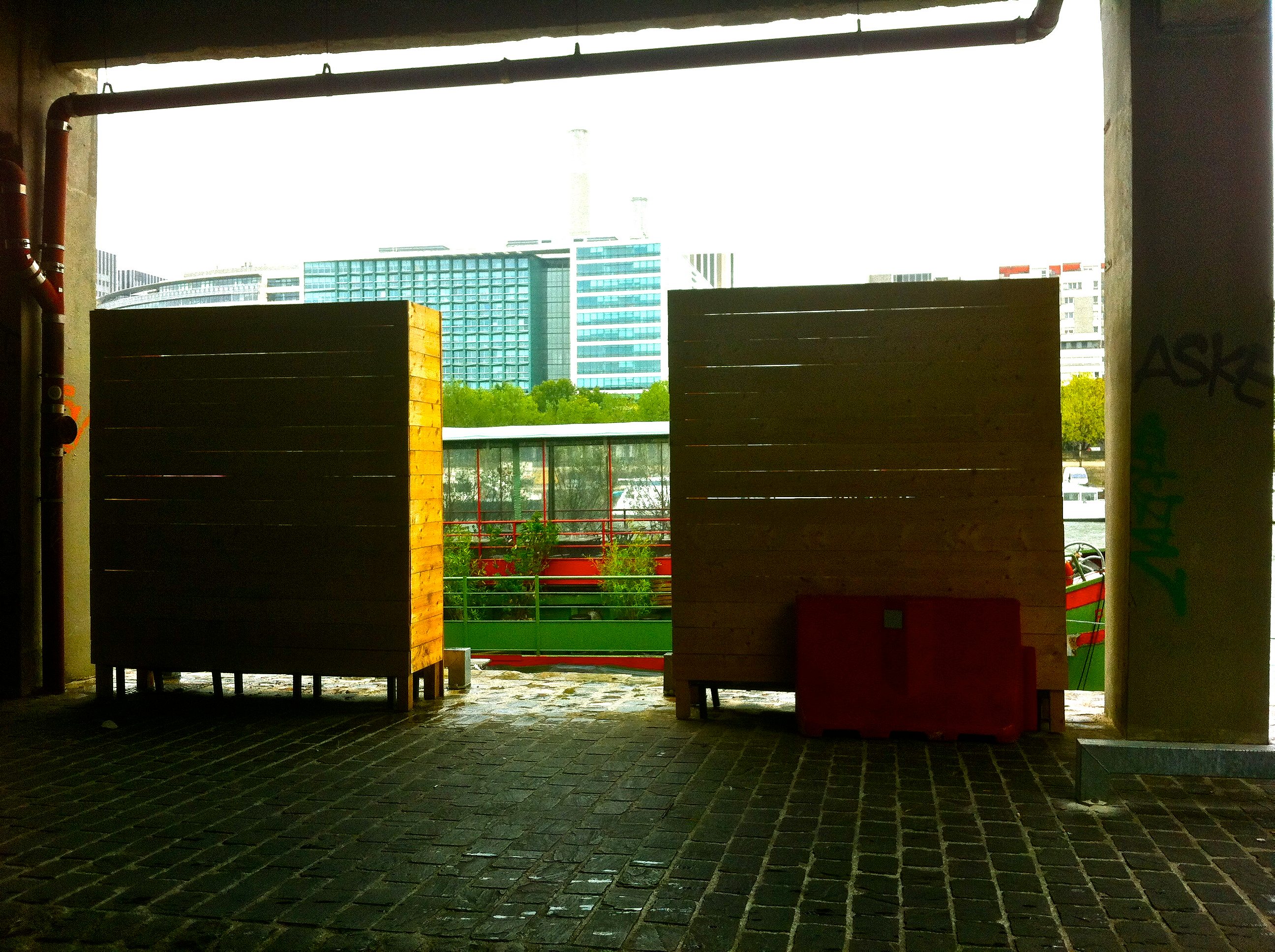
It is likely they never will. Anne Hidalgo, the mayor of Paris, has promised the Quai d’Austerlitz migrants lodging in emergency housing centers throughout the city and its suburbs. The residents of the camp are being relocated to emergency shelters, some of which are located outside of Paris, in Nanterre, Boulogne-Billancourt, Pantin and Vincennes.
This initiative may ensure that the people who lived in the Austerlitz camp will be off the streets for the winter. Still, their future in France is anything but certain. Applying for asylum is a notoriously long and bureaucratic process, made all the more difficult by the fact that few have permanent addresses or telephone numbers.
France has pledged to accept 24,000 asylum seekers over two years as part of a European Union crisis plan to aid the increasing numbers of refugees seeking shelter and security in Europe. If the government succeeds in providing the people who lived in the camp at Quai d’Austerlitz with a safe and permanent home in France, it may be an early step in building the necessary infrastructure to receive and care for thousands more of the dispossessed.
But tonight, many refugees and migrants will not enjoy government accommodation. In other camps, like the tent city at the Porte de Saint-Ouen in northwestern Paris, men, women and even young children will continue to brave the cold nights in sleeping bags and nylon tents.